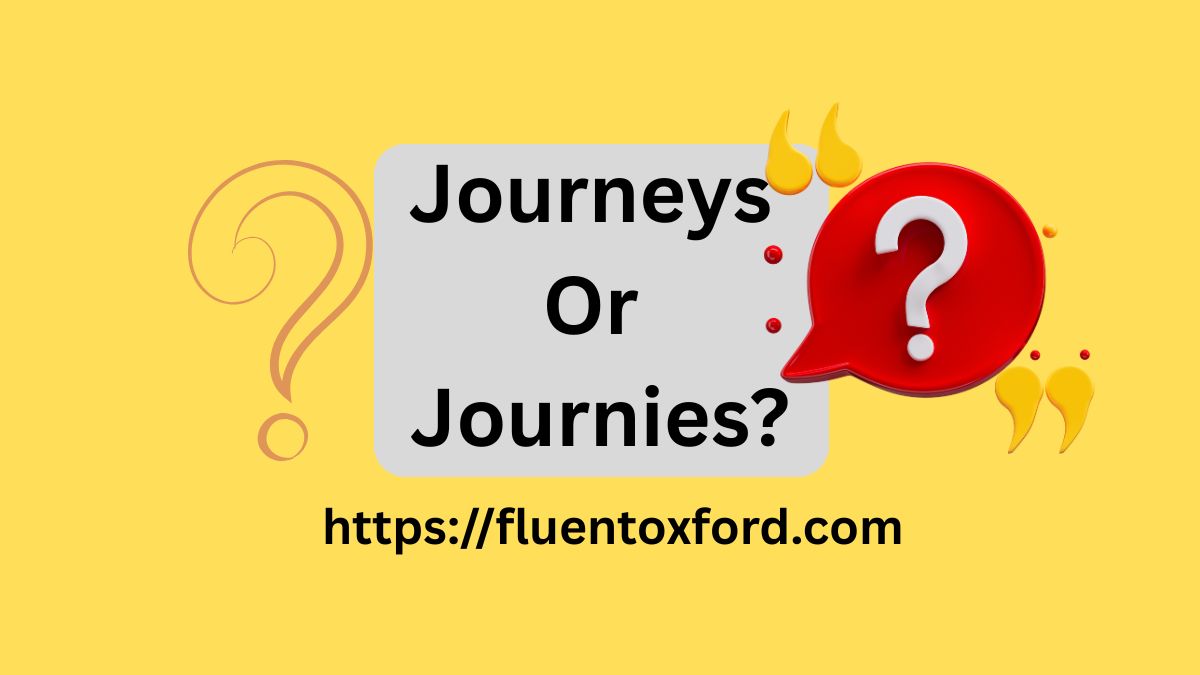The term “Journeys Or Journies?” refers to the plural form of the word “journey,” which means a trip, voyage, or experience of traveling from one place to another. In English grammar, nouns that end in a vowel followed by “y” form their plural by simply adding “s.” Therefore, the correct plural of “journey” is “journeys.” The spelling “journies” is incorrect, even though it may seem logical based on words like “fly” becoming “flies.” Understanding the proper pluralization helps improve writing accuracy and fluency.
English can be full of surprises, especially when it comes to spelling rules. Some words follow patterns, while others break the norm. The confusion between “Journeys Or Journies?” is a perfect example of how tricky the language can be. Many people instinctively apply the “y to ies” rule, but this isn’t always correct. Learning these small details makes a big difference in mastering English spelling.
The correct usage of words is essential in both spoken and written communication. Whether you’re writing an essay, composing a travel blog, or discussing multiple adventures, using “journeys” instead of “journies” ensures clarity and correctness. Understanding these grammar rules helps build stronger writing skills and avoids common mistakes.
Why Is There Confusion?

The confusion between “journeys” and “journies” comes from a common pluralization rule in English. Typically, when a word ends in “y” preceded by a consonant, the plural form changes the “y” to “i” and adds “-es” like “baby” to “babies” or “city” to “cities.” Because of this pattern, some assume “journey” should follow the same rule. However, “journey” is different because the letter before “y” is a vowel, not a consonant. In such cases, only “s” is added, making “journeys” the correct plural form. This irregularity in English grammar creates uncertainty, leading people to mistakenly write “journies” when trying to pluralize “journey.”
Common Rule for Pluralizing “Y” Words
| Singular | Plural |
| Fly | Flies |
| City | Cities |
| Baby | Babies |
| Story | Stories |
Because of this pattern, many assume that “journey” should follow suit, changing to “journies.” However, this is incorrect due to an important exception.
“Journeys” vs. “Journies”: The Correct Plural and Why
The correct plural form of “journey” is “journeys”—not “journies.” This is because “journey” ends in “-ey” rather than just “-y.” If a word ends in a consonant + “y,” the “y” changes to “ies” (e.g., “city” → “cities”). However, if a word ends in a vowel + “y,” only “s” is added (e.g., “key” → “keys”). Since “journey” ends in “ey” (a vowel + “y”), the correct plural form is “journeys.”
The mistake of writing “journies” happens because many English words follow the “y to ies” pattern. However, understanding the vowel rule helps avoid this error. Using “journeys” in writing ensures clarity, professionalism, and correct grammar. Whether referring to real travels or metaphorical experiences, applying the right spelling strengthens communication. By remembering this simple rule, writers and speakers can confidently use the correct plural form and avoid common spelling mistakes in English.
Why Doesn’t “Journey” Follow the Y-to-IE Rule?
The word “journey” doesn’t follow the typical Y-to-IE rule because of the letter before the “y.” In English, nouns ending in a consonant + y change to “ies” (e.g., “baby” → “babies”). However, when a noun ends in a vowel + y, it simply takes an “s” (e.g., “key” → “keys”). Since “journey” ends in “ey” (a vowel + “y”), it follows this second rule. That’s why the correct plural is “journeys,” not “journies.” Understanding this helps avoid spelling mistakes in English writing.
The answer lies in word origin and spelling rules:
- Vowel Preceding the Y: The key factor is that “journey” has a vowel before the ‘y’ (e) rather than a consonant. Words that follow this pattern do not change the ‘y’ to ‘i’ before adding ‘s’.
- Words That Follow the Same Pattern
| Singular | Plural |
| Monkey | Monkeys |
| Valley | Valleys |
| Chimney | Chimneys |
| Attorney | Attorneys |
Since journey follows the same pattern as “monkey” or “valley,” its plural form is “journeys.”
What Does “Journey” Mean?
A “journey” is a trip or experience of traveling from one place to another. It can refer to physical travel, like a vacation or road trip, or a metaphorical experience, such as personal growth or life changes. The word signifies movement, progress, or adventure, making it a common term in storytelling, travel writing, and everyday conversations.
The word “journey” has both literal travels and metaphorical paths as meanings:
- Literal Meaning: Refers to a physical trip from one place to another.
- Metaphorical Meaning: Describes a personal, emotional, or professional growth experience.
Examples of “Journeys” in Context
- Literal Usage: “Our journeys through Europe lasted three months.”
- Metaphorical Usage: “Life’s journeys teach us invaluable lessons.”
- Historical Context: “Many explorers recorded their journeys in detailed diaries.
- “Physical Travel: “Our summer vacations have always been exciting, but this year’s journeys through Europe were truly unforgettable.”
- Career Progression: “Her professional journeys took her from a small startup to leading a multinational corporation.”
Grammar Rule Behind “Journeys”

The plural of “journey” follows a simple grammar rule. When a noun ends in a vowel + y, it forms the plural by adding “s” instead of changing “y” to “ies.” Since “journey” ends in “ey” (a vowel before “y”), the correct plural is “journeys.” This rule applies to similar words like “key” → “keys” and “boy” → “boys.”
To reinforce the correct grammatical rule, remember these points:
- If a word ends in consonant + y, change “y” to “i” and add “es” (e.g., “baby” → “babies”).
- If a word ends in vowel + y, simply add “s” (e.g., “journey” → “journeys”).
This rule applies to all words ending in “-ey”:
| Word | Plural |
| Money | Monies |
| Turkey | Turkeys |
| Kidney | Kidneys |
“Journeys” fits into this category, making “journies” incorrect.
Examples of “Journeys” in Different Contexts
To understand how “journeys” is used correctly, here are a few real-world examples:
Travel Context
- “The couple embarked on many adventurous journeys together.”
- “Our journeys through Africa were life-changing.”
Metaphorical Usage
- “Each of us has our own journeys toward self-improvement.”
- “The entrepreneur shared her journeys to success.”
Historical Context
- “The medieval explorer documented his journeys in a leather-bound journal.”
- “Space missions are among the greatest journeys of human history.”
Education & Learning:
- Her journeys through different universities helped her gain a well-rounded education.
- The scientist’s research journeys led to groundbreaking discoveries in medicine.
Career & Professional Development:
- His journeys through various industries helped him develop a diverse skill set.
- The entrepreneur’s business journeys taught her the importance of perseverance and innovation.
Synonyms for “Journey”
Expanding your vocabulary can improve your writing. Here are some synonyms for “journey” based on context:
Single-Word Synonyms
- Trip
- Voyage
- Expedition
- Trek
- Odyssey
- Sojourn
Phrase-Based Alternatives
- Road trip
- Pilgrimage
- Grand tour
- Travel adventure
- Road to success
- Quest for knowledge
Using synonyms for “journey” can help avoid repetition while maintaining clarity.
Etymology of “Journey”
The word “journey” comes from the Old French “jornee,” meaning “a day’s travel” or “a day’s work.” It traces back to the Latin “diurnum,” meaning “daily.” Over time, its meaning expanded beyond daily travel to signify any trip or experience. Today, “journey” represents both physical travel and personal or metaphorical progress.
Understanding the word origin of “journey” provides insight into its evolution.
- Origin: The word “journey” comes from the Old French journee, meaning “a day’s travel.”
- Latin Root: Derived from diurnum, meaning “daily.”
- Evolution: Over time, “journey” expanded from meaning “one day’s travel” to any extended trip or experience.
Conclusion
The correct plural of “journey” is “journeys,” not “journies.” English spelling rules can be confusing, but understanding them helps avoid mistakes. Since “journey” ends in a vowel + “y,” we simply add “s” to make it plural. Many people assume “journies” is correct because some words change “y” to “ies.” However, “journey” follows a different rule.
Learning the right spelling makes writing clearer and more professional. Whether you’re talking about real trips or life experiences, using the correct plural form matters. Next time you wonder about “Journeys Or Journies?”, remember that “journeys” is the right choice. Small details like this make a big difference in communication.
FAQs
1. Is “journeys” the correct plural of “journey”?
Yes, “journeys” is the correct plural form of “journey.” The word follows standard spelling rules because it ends in a vowel followed by “y,” so you simply add “-s” instead of changing “y” to “i” and adding “-es.”
2. Why isn’t “journies” correct?
“Journies” is incorrect because “journey” ends in “-ey,” not just “-y.” In English, words with a vowel before “y” (like “monkey” → “monkeys”) simply take an “s” in the plural form.
3. What are some words that follow the same pluralization pattern as “journey”?
Examples include:
- Monkey → Monkeys
- Chimney → Chimneys
- Valley → Valleys
4. Can “journey” be pluralized differently in British and American English?
No, “journeys” is the universally accepted plural in both British and American English. There is no regional variation in this case.
5. What are some synonyms for “journey”?
Common synonyms for “journey” include:
- For literal travels: Trip, voyage, expedition, trek.
- For metaphorical paths: Quest, odyssey, adventure, pilgrimage.

As an admin at Fluent Oxford, Maida Queen is the driving force behind our vibrant learning community. With a deep passion for English language education, she ensures that our platform remains a dynamic, engaging, and supportive space for learners worldwide.
Maida expertly manages content, assists users with their grammar and fluency queries, and fosters an interactive environment where learning feels effortless and enjoyable. Whether you need guidance, motivation, or just a friendly face in the Fluent Oxford community, Maida is always there to help you reach your English language goals.








